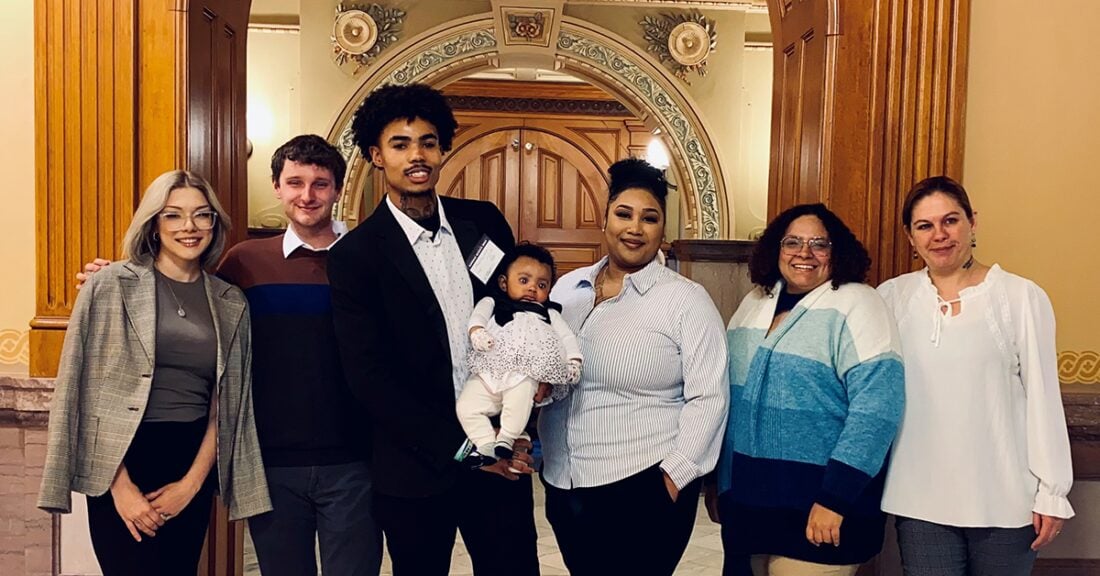Kansas Enacts New Permanency Option for Older Youth in Foster Care

From left: Kansas advocates Gabriella Guido, Cory Seller, Marquan Teetz (holding child), Nykia Watkins, Carol Roberts and Kassi McDowell.
On April 15, 2024, Kansas Gov. Laura Kelly signed a law making the state the first in the nation to create a SOUL Family legal permanency option — a way for older youth in foster care to form legal, lasting families.
The law allows young people ages 16 and older who are in foster care to establish permanent legal bonds with trusted adult caregivers without severing legal ties to their biological parents and siblings. Family relationships legalized under SOUL Family will be eligible for services that help young people transition successfully to adulthood, including:
- financial support;
- educational benefits; and
- health coverage.
“Now Kansans ages 16 and older who are leaving foster care will be empowered to choose who will join them on their journey as they grow into the next phase of their lives, finish schooling, settle into jobs and become adult members of their greater community,” says Kansas Department for Children and Families (DCF) Secretary Laura Howard.
A Permanency Innovation in Kansas
SOUL stands for Support, Opportunity, Unity and Legal Relationships. The framework for SOUL Family was originally conceived in 2018 by Jim Casey Fellows — young leaders and advocates with foster care experience who participate with the Annie E. Casey Foundation’s Jim Casey Youth Opportunities Initiative®. In 2022, state DCF leaders and young Kansans who have experienced foster care committed to developing a SOUL Family proposal as an innovative solution to address the state’s high number of young people exiting foster care without solid relationships and connections. In Kansas, more than 56% of youths 16 and older leave foster care without permanent families.
“Innovations like SOUL Family are needed to help reduce the number of young people leaving foster care without critical relationships and support,” says Leslie Gross, director of the Casey Foundation’s Family Well-Being Strategy Group. Nationally, 51% of older youths in foster care — about 20,000 — age out of these systems each year.
Young leaders, advocates, DCF officials and representatives of the state’s four private foster care providers adapted SOUL Family to address Kansas’ specific child welfare needs. They will continue to partner in designing the mechanisms for implementing and supporting the plan.
“All older youth in foster care want the ability to choose,” says Marquan “MT” Teetz, an advocate for the permanency option who told legislators about his experience in Kansas’ foster care system. “We’ve been ordered most of our lives by a system that doesn’t understand us or the connections we’ve built.”
The development of SOUL Family marks a significant milestone in the state’s journey toward more youth-led and youth-centered case planning. When the new permanency option is implemented, young people can choose caregivers from a group of adults, including kin, with whom they already have solid relationships, to ensure they leave foster care with lasting bonds and support.
“Had it been available for me,” Teetz says, “SOUL Family could have allowed me and my aunt to remain together and offered the necessary resources and guidance to help us navigate our situation.”
The Origin of the SOUL Family Model
In 2018, a group of Jim Casey Fellows saw a need for a new legal permanency option for older youth in foster care. The existing legal permanency options — reunification, adoption and guardianship — are effective for finding permanent families for many young people. However, they do not address the complexities, needs and breadth of experiences of many older youth who need rock-solid lifelong connections.
The Fellows envisioned a way to ensure more young people could leave foster care with the sense of stability and belonging provided by a loving, lasting and legal family. Their idea, which they later named SOUL Family, would:
- provide a planning process that expands and honors the young person’s ability to identify potential caregivers in their own networks of supportive adult relationships — including kin and non-kin who are chosen family;
- allow young people to remain legally connected to their biological parents and siblings;
- establish their new legal family for life, recognized by the courts and the community; and
- ensure the young people receive the same types of financial support and services attached to other permanency options so they do not have to choose between gaining a family and receiving needed services or assistance.
“SOUL Family represents the power of solutions created by young people who have experienced the child welfare system — and know best what they need to thrive into adulthood,” says Gross. “This new permanency option has the potential to change the trajectory for young people who need families. We are extremely proud of the Jim Casey Fellows who designed this innovation and their peers and partners in Kansas who are collaborating to make it a reality.”






